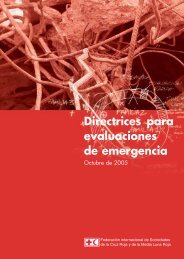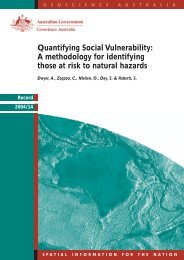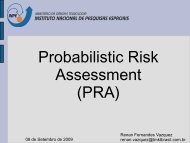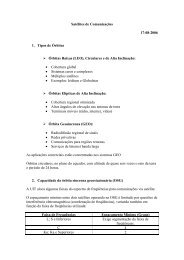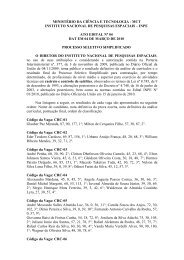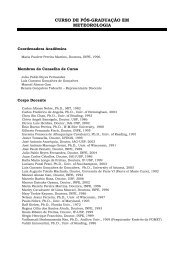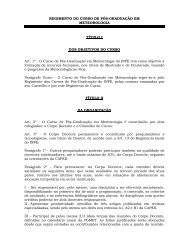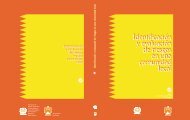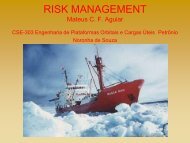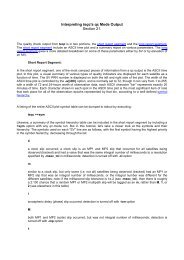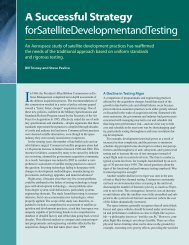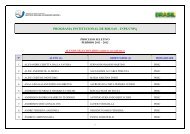Living with Risk. A global review of disaster reduction initiatives
Living with Risk. A global review of disaster reduction initiatives
Living with Risk. A global review of disaster reduction initiatives
You also want an ePaper? Increase the reach of your titles
YUMPU automatically turns print PDFs into web optimized ePapers that Google loves.
3<br />
<strong>Living</strong> <strong>with</strong> <strong>Risk</strong>: A <strong>global</strong> <strong>review</strong> <strong>of</strong> <strong>disaster</strong> <strong>reduction</strong> <strong>initiatives</strong><br />
110<br />
Case: Algeria<br />
In November 2001, unusually heavy rain fell<br />
in the Algerian capital, Algiers. Flash floods<br />
and mudslides swept through many parts <strong>of</strong><br />
the city, killing more than 800 people. At the<br />
time it was suggested that <strong>disaster</strong> management<br />
structures and the population were woefully<br />
unprepared for such an event. However,<br />
it turned out that several cases <strong>of</strong> human activity<br />
and unsuited policies actually may have<br />
contributed to the severity <strong>of</strong> the <strong>disaster</strong>. Due<br />
to the scope <strong>of</strong> the <strong>disaster</strong> and its location in<br />
the centre <strong>of</strong> the capital, all levels <strong>of</strong> the government<br />
were seriously shaken. Senior <strong>of</strong>ficials<br />
experienced, first-hand, the lack <strong>of</strong> coordination<br />
<strong>of</strong> the various parties concerned <strong>with</strong> the<br />
emergency response, as well as having to accept<br />
their own failure <strong>of</strong> foresight.<br />
Since this <strong>disaster</strong>, there is a new way <strong>of</strong> thinking<br />
about <strong>disaster</strong> management in Algeria, particularly<br />
in urban areas. This has been demonstrated<br />
through several <strong>initiatives</strong> that started<br />
only months after the <strong>disaster</strong>. For the first time<br />
ever, the Head <strong>of</strong> State ordered all the ministries<br />
to take serious account <strong>of</strong> the notion <strong>of</strong><br />
<strong>disaster</strong> <strong>reduction</strong> and include it in their various<br />
programmes. The Prime Minister also discussed<br />
the matter during the Council <strong>of</strong> the<br />
Government, and called for a permanent coordinating<br />
structure <strong>of</strong> all the actors involved in<br />
<strong>disaster</strong> management. The Ministry <strong>of</strong> Interior<br />
is developing a permanent structure which<br />
will coordinate all phases <strong>of</strong> <strong>disaster</strong> management<br />
including risk <strong>reduction</strong> measures,<br />
response and rehabilitation. The General<br />
Directorate <strong>of</strong> Civil Protection is shifting its<br />
attention towards prevention activities. The<br />
current ruling political party in Algiers is<br />
preparing to include <strong>disaster</strong> management in<br />
its program for a forthcoming legislative election<br />
campaign. Senior party <strong>of</strong>ficials are soliciting<br />
expert advice from scientific and technical<br />
advisors in preparing their programme.<br />
Since the floods, international organizations<br />
have joined forces to help in risk <strong>reduction</strong> projects.<br />
The Mayor <strong>of</strong> Paris paid a visit to the<br />
affected areas and signed a memorandum <strong>of</strong><br />
cooperation between the Wilaya (province) <strong>of</strong><br />
Algiers and the Atelier Parisien d’Urbanisme for a<br />
programme to promote better urban planning<br />
in Algiers. In early 2002, another French<br />
organization, Architecture-Urgence, signed a<br />
convention for cooperation <strong>with</strong> the Wilaya <strong>of</strong><br />
Algiers to work on urban planning to reduce<br />
<strong>disaster</strong>s.<br />
The UN <strong>of</strong>fice in Algiers also installed a commission<br />
to work on <strong>disaster</strong> <strong>reduction</strong> in Algeria<br />
and engaged an Italian specialist to discuss<br />
the matter <strong>with</strong> Algerian authorities.<br />
UN- HABITAT proposed a cooperation project<br />
in <strong>disaster</strong> <strong>reduction</strong> <strong>with</strong> the Algerian government.<br />
A World Bank delegation has similarly<br />
visited Algeria to discuss a long-term<br />
project in <strong>disaster</strong> risk management. An expert<br />
in urban planning from USAID visited<br />
Algiers less than a month after the <strong>disaster</strong> to<br />
discuss eventual cooperation in <strong>disaster</strong> <strong>reduction</strong><br />
in urban areas <strong>with</strong> many Algerian institutions.<br />
USAID has expressed an interest in<br />
preparing a project proposal for that purpose.<br />
Within the first six months after the <strong>disaster</strong>,<br />
several seminars or conferences related to <strong>disaster</strong><br />
<strong>reduction</strong> were either held or being planned.<br />
An Algerian-French colloquium on sustainable<br />
development and <strong>disaster</strong> <strong>reduction</strong> took place<br />
in Algiers only weeks after the <strong>disaster</strong>. Similar<br />
colloquia are planned for other regions <strong>of</strong> the<br />
country. All <strong>of</strong> these actions demonstrate that<br />
Algerian authorities at all levels are more aware<br />
today about the risks they face.<br />
Case: Kazakhstan<br />
The Republic <strong>of</strong> Kazakhstan <strong>of</strong>ten experiences<br />
earthquakes, floods, landslides, and coastal<br />
floods. Only recently has the importance <strong>of</strong><br />
natural <strong>disaster</strong> <strong>reduction</strong> been recognized. In<br />
May 2000, Kazakhstan’s Emergency Situation<br />
Agency published the Plan <strong>of</strong> Preparedness <strong>of</strong><br />
Kazakhstan for Natural Disasters <strong>with</strong> the<br />
cooperation <strong>of</strong> the National Red Cross and<br />
Red Crescent Society and UNDP. The introduction<br />
<strong>of</strong> the plan cites the considerable financial<br />
losses incurred by the country because <strong>of</strong><br />
<strong>disaster</strong>s and urges all organizations to take<br />
proper action to reduce their negative impact<br />
on the country’s development. The report provides<br />
guidance on preparedness activities for<br />
<strong>disaster</strong> <strong>reduction</strong>, response scenarios for <strong>disaster</strong>s,<br />
legislation for efficient mobilization <strong>of</strong><br />
organizations concerned, and implementation<br />
<strong>of</strong> different measures that can be deployed<br />
against various risks.



